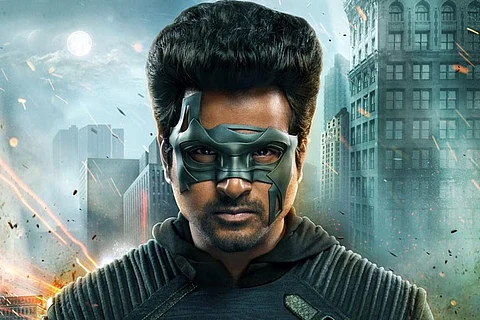

The first thing you need to know about PS Mithran’s Hero is that it is more of a hero film than a superhero film as it was marketed. The second thing you need to know is that the film is a lament on the education system; it is something of a tribute to the 1993 Shankar film Gentleman – and has learnt nothing from the criticism that the latter has drawn. But we’ll get to that later.
PS Mithran’s last film Irumbuthirai, which was about data theft, may have taken some liberties with facts but it was still a well-researched film that was mostly realistic. Hero has a good idea at the heart of it but is built on a shaky premise. Just like Tamil cinema has stereotyped the rural villain as someone who has a biriyani parcel in one hand and a sickle in another, it has stereotyped the corporate villain as a heartless coat-suit guy (usually played by a North Indian actor, in this case Abhay Deol) who walks around with a sneer.
In Hero, the corporate villain is someone who lobotomises school children for their innovative science projects… because these inventions could cause heavy losses to several industries. The hapless Abhay Deol says, “Lobotomy pannidu!” so many times that he would have been a better fit in Mindhunter 3 than here.
It goes without saying that anyone who has any knowledge about science, technology and taking innovations to the market, would find this premise far-fetched. A small-scale school project which hasn’t been subjected to rigorous trials is hardly going to cause panic in the international business community overnight. Even if the idea was soundproof and thoroughly tested, it is quite silly to claim that corporates would destroy a world-changing invention rather than reap profit from it.
Anyway, it is on this questionable territory that Shakti (Sivakarthikeyan), whose childhood dream it was to become Shaktimaan, sets foot. His job is to print fake education certificates and procure highly coveted college seats for a commission. Along the way, we learn about the corruption in the education system, Gentleman style. Though NEET (the introduction of which triggered widespread discussions on caste and education in Tamil Nadu) is mentioned in passing and the film is supposedly about reforming the education system and bringing out the talents of the underprivileged, it is completely silent on caste-based reservation as a form of social justice. In fact, the only time reservation is mentioned is when a corrupt official makes a disparaging remark about merit and “quota” seats.
Considering the film is a hat-tip to Gentleman, which was about “merit” being sacrificed for reservation – a completely uninformed and casteist perspective – this is not surprising. Mari Selvaraj’s Pariyerum Perumal, which released in 2018, spoke emphatically about systemic and institutionalised discrimination in the education sector. Its protagonist Pariyan is referred to as a “quota kozhi” who doesn’t deserve his place in the classroom. Hero glibly sidesteps all of this, and provides convenient solutions that don’t address fundamental questions on the right to education.
Arjun Sarja (an accused in a sexual harassment case filed by actor Sruthi Hariharan) plays Sathyamoorthy (he was Krishnamoorthy in Gentleman), a vigilante who turns into a mentor for Shakti – “We need a hero now, a gentleman is not enough,” he tells the latter. But since our regular heroes anyway perform the acts of a superhero, Shakti’s science-enabled transformation, which happens over two hours into the film, feels more like a gimmick than a genre-satisfying twist. Sivakarthikeyan is fine as the joking, casual youth – a role he ever so often performs – but his Mask avatar is less convincing. The cinematography (George C Williams), however, makes the film look slick and stylish.
Kalyani Priyadarshan appears as counsellor Meera, and I wish Mithran had learnt from her balloon trick and let the pressure of including a romance track in the film, fly up into the sky. The “love” is not only uninspiring, it also drags down the pace of the film in the first half with some insipid songs (Yuvan’s background score is better though). Ivana plays Madhi, a schoolgirl who is persecuted for her invention; the film will have you believe that going to Mars in a water-fuelled autorickshaw is easier than filing a patent, and that courts hand out verdicts like Nattamais pronouncing instant theerpu.
The writing becomes overly preachy towards the end, firmly rooting Hero in the “message padam” genre more than anything else. One wonders if this was Mithran’s original idea executed according to his vision or if production and market compulsions made him strike compromises with the material. I, for one, would like to see the ‘rough note’ version of Hero before it became the bound script.
Disclaimer: This review was not paid for or commissioned by anyone associated with the series/film. TNM Editorial is independent of any business relationship the organisation may have with producers or any other members of its cast or crew.